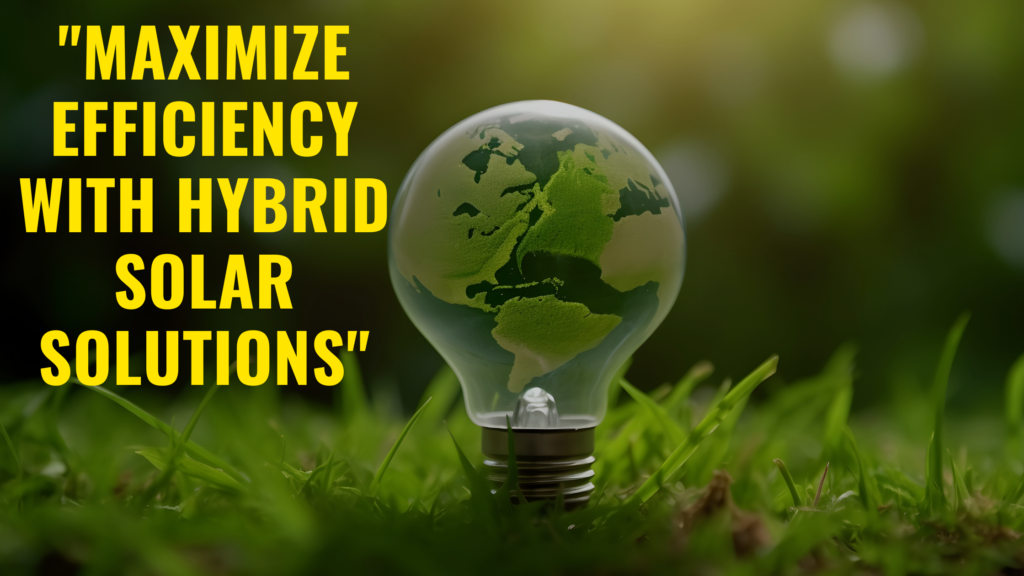"Unlock Energy Efficiency with Hybrid Solar Technology"
As the world moves towards more sustainable and efficient energy solutions, hybrid solar technology is emerging as a powerful option for homeowners and businesses alike. Combining the best features of both grid-tied and off-grid systems, hybrid solar setups offer enhanced reliability, flexibility, and energy independence. In this blog, we will explore the benefits, components, and considerations of hybrid solar technology, while also examining the various solar products that can optimize these systems for maximum efficiency.
Introduction
Hybrid solar systems, as the name suggests, integrate elements of both grid-tied and off-grid solar systems. These systems not only generate electricity from solar panels but also store excess energy in batteries for use during power outages or periods of low sunlight. This dual capability makes hybrid solar systems highly versatile and reliable, providing continuous power supply and enhancing energy security.
Benefits of Hybrid Solar Systems
1. Increased Energy Efficiency: Hybrid solar systems optimize energy use by combining solar power generation with battery storage and grid connectivity. This ensures that your energy needs are met efficiently, regardless of the time of day or weather conditions.
2. Energy Independence: With a hybrid solar system, you are less reliant on the public grid. During power outages or peak demand periods, you can draw power from your batteries, ensuring a steady supply of electricity.
3. Cost Savings: By generating your own electricity and storing excess power, you can reduce your electricity bills. Additionally, hybrid solar systems can take advantage of net metering, where excess power is sold back to the grid, further offsetting costs.
4. Environmental Benefits: Hybrid solar systems reduce your carbon footprint by utilizing renewable energy and decreasing reliance on fossil fuels. This contributes to a more sustainable and eco-friendly lifestyle.
5. Grid Stability: By reducing the strain on the public grid during peak times, hybrid solar systems help improve overall grid stability and reliability.
Components of a Hybrid Solar System
Understanding the components of a hybrid solar system is crucial for optimizing its performance and ensuring efficient energy management. Here are the key components:
1. Solar Panels
Solar panels are the primary source of energy generation in a hybrid solar system. They convert sunlight into direct current (DC) electricity through photovoltaic cells. The efficiency and number of solar panels will depend on your energy requirements and available space.
2. Charge Controller
A charge controller regulates the voltage and current from the solar panels to the batteries, ensuring efficient charging and preventing overcharging. This component is essential for maintaining battery health and longevity.
3. Batteries
Batteries store excess electricity generated by the solar panels for later use. They provide backup power during outages and help manage energy demand. Common battery types include lead-acid, lithium-ion, and flow batteries, each with specific benefits and considerations.
4. Inverter
An inverter converts DC electricity from the solar panels and batteries into alternating current (AC) electricity, which is used by most household appliances. Hybrid inverters are designed to manage power flow between solar panels, batteries, and the grid.
5. Grid Connection
A hybrid solar system remains connected to the public grid, allowing for the import of electricity when solar generation is insufficient and the export of excess power. This connection provides flexibility and ensures a reliable power supply.
6. Monitoring System
A monitoring system tracks the performance of your hybrid solar setup, providing real-time data on energy production, consumption, and battery status. This information helps optimize system efficiency and identify any issues promptly.
Selecting the Right Solar Products
Choosing the right solar products is crucial for maximizing the performance and efficiency of your hybrid solar system. Here are some key considerations when selecting solar products:
Solar Panels
1. Efficiency: High-efficiency solar panels, such as monocrystalline panels, can generate more electricity from the same amount of sunlight, making them ideal for maximizing energy production.
2. Durability: Ensure that the solar panels are durable and can withstand harsh weather conditions. Look for panels with certifications like IEC 61215 and IEC 61730, which indicate compliance with international standards.
3. Warranty: A good warranty provides peace of mind and protects your investment. Look for solar panels with warranties of at least 25 years.
Batteries
1. Capacity: Choose batteries with sufficient capacity to meet your energy needs. This depends on your daily energy consumption and the number of days you want to store electricity for.
2. Cycle Life: Consider the cycle life of the batteries, which indicates how many charge and discharge cycles they can undergo before their capacity significantly degrades. Lithium-ion batteries typically have a longer cycle life than lead-acid batteries.
3. Maintenance: Some batteries, like sealed lead-acid and lithium-ion, require minimal maintenance, while others, like flooded lead-acid, require regular maintenance. Choose a battery type that fits your maintenance preferences.
Inverters
1. Power Rating: Ensure that the inverter’s power rating matches your energy consumption needs. It should be able to handle the peak power demand of your household appliances.
2. Efficiency: Look for high-efficiency inverters to minimize energy loss during the DC to AC conversion process.
3. Features: Some inverters come with additional features like grid-tie capability, battery management systems, and remote monitoring. Consider these features based on your specific needs.
Designing and Installing a Hybrid Solar System
Designing and installing a hybrid solar system requires careful planning and consideration of various factors. Here are some steps to guide you through the process:
1. Assess Your Energy Needs
Start by calculating your daily energy consumption to determine the size of the hybrid solar system required. Consider factors like the number of occupants, types of appliances, and usage patterns. This will help you design a system that meets your energy needs efficiently.
2. Evaluate Your Location
Evaluate your location’s solar potential by considering factors like the amount of sunlight received, shading, and roof orientation. Tools like solar insolation maps and online calculators can help estimate the solar potential of your location.
3. Choose the Right Components
Based on your energy needs and location, select the appropriate components for your hybrid solar system. This includes choosing the right solar panels, batteries, charge controller, and inverter.
4. Design the System Layout
Design the layout of your hybrid solar system, considering factors like panel placement, wiring, and space requirements for batteries and inverters. Ensure that the system is designed for optimal efficiency and safety.
5. Install the System
Install the system following manufacturer guidelines and local regulations. If you’re not experienced with electrical installations, it’s advisable to hire a professional installer to ensure a safe and efficient setup.
Conclusion
Hybrid solar technology offers a powerful solution for those looking to enhance their energy efficiency, reduce reliance on the public grid, and contribute to a more sustainable future. By understanding the key components and selecting the right solar products, you can design a reliable and efficient hybrid solar system tailored to your needs.
As you embark on your journey towards energy independence with hybrid solar technology, remember to assess your energy needs, evaluate your location’s solar potential, and choose high-quality components. With careful planning and the right hybrid solar system, you can enjoy a continuous, clean, and reliable source of electricity for your home or business. Hybrid solar technology not only provides immediate benefits in terms of cost savings and energy security but also contributes to a greener and more sustainable world for future generations.


